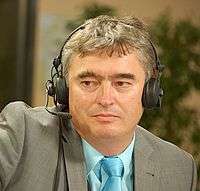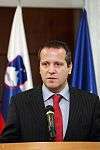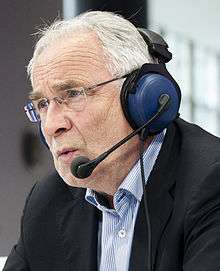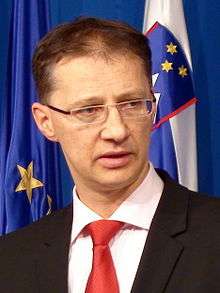2014 European Parliament election in Slovenia
European Parliament elections were held in Slovenia on 25 May 2014. It was the first in the series of three elections held in the 2014, and the major test leading up to the parliamentary elections in July. The political atmosphere was in a crisis that started with the fall of Borut Pahor's government, then Janez Janša's government in 2013, the latter coming after Janša was accused of corruption.[2] The cabinet of Alenka Bratušek was breaking up, as the former leader of the Positive Slovenia Zoran Janković, who was under the suspicion of corruption, announced his candidature for party president, even though the coalition parties threatened to leave the government if he was to be elected, which later he was.[3]
| ||||||||||||||||||||||||||||||||||||||||||||||||||||||||||||||||||||||||||||||||||
All 8 Slovenian seats to the European Parliament | ||||||||||||||||||||||||||||||||||||||||||||||||||||||||||||||||||||||||||||||||||
|---|---|---|---|---|---|---|---|---|---|---|---|---|---|---|---|---|---|---|---|---|---|---|---|---|---|---|---|---|---|---|---|---|---|---|---|---|---|---|---|---|---|---|---|---|---|---|---|---|---|---|---|---|---|---|---|---|---|---|---|---|---|---|---|---|---|---|---|---|---|---|---|---|---|---|---|---|---|---|---|---|---|---|
| Turnout | 24.55%[1] | |||||||||||||||||||||||||||||||||||||||||||||||||||||||||||||||||||||||||||||||||
| ||||||||||||||||||||||||||||||||||||||||||||||||||||||||||||||||||||||||||||||||||
The main characteristic of the elections was the participation of several new parties, founded during the recent years of crisis. Verjamem was among the last parties to be founded before the elections, and surprisingly finished in third place, winning one seat in the European Parliament.
Candidates
| Political Party | Candidate | Candidate | Candidate | Candidate | Candidate | Candidate | Candidate | Candidate |
|---|---|---|---|---|---|---|---|---|
| Civic List (DL) | Senko Pličanič | Polonca Komar | Marko Pavlišič | Vesna Alaber | Milan Dubravac | Emina Hadžić | Monika Bračika | Miha Istenič |
| Democratic Party of Pensioners of Slovenia (DeSUS) | Ivo Vajgl | Marija Pukl | Izidor Salobir | Ingeborg Ivanek | Bojan Bratina | Jana Jenko | Anton Dragan | Marjana Kotnik Poropat |
| Kacin-Concretly | Jelko Kacin | Polona Sagadin | Dorijan Maršič | Faila Pašić Bišić | Andrej Lavtar | Tatjana Greif | Jure Pucko | Sara Karba |
| New Slovenia (NSi), Slovenian People's Party (SLS) | Lojze Peterle | Aleš Hojs | Monika Kirbiš Rojs | Neža Pavlič | Vida Čadonič Špelič | Jakob Presečnik | Ljudmila Novak | Franc Bogovič |
| Pirate Party (PS) | Rolando Benjamin Vaz Ferreira | / | / | / | / | / | / | / |
| Positive Slovenia (PS) | Jože Mencinger | Melita Župevc | Valerija Medic | Jarko Čehovin | Mirjam Bon Klanjšček | Marjan Sedmak | Britta Bilač | Peter Vilfan |
| Sanjska Služba | Uroš Uršič | David Breskvar | Barbara Ložar | Boštjan Novak | Ksenija Krenjak Kramar | Andreja Korade | Marko Korenjak | / |
| Slovenian Democratic Party (SDS) | Milan Zver | Romana Tomc | Patricija Šulin | Anže Logar | Damijan Terpin | Carmen Merčnik | Vlasta Krmelj | Andrej Šircelj |
| Slovenian Nation | Bogomil Knavs | Janica Millonig | Dušan Egidij Kubot Totislo | Ivica Kranjc | Miha Majc | Simona Drev | / | / |
| Slovenian National Party (SNS) | Zmago Jelinčič Plemeniti | Sergej Čas | Helena Rupar | Alenka Jelenovič | Jos Zalokar | Katarina Langus Šeligo | Jelena Miljković | Folko Puconja |
| Social Democrats (SD) | Igor Lukšič | Tanja Fajon | Mojca Kleva Kekuš | Anton Bebler | Marina Vovk | Matevž Frangež | Ljubica Jelušič | Patrick Vlačič |
| Solidarnost, za pravično družbo | Dušan Keber | Marjutka Hafner | Damjan Mandelc | Nataša Osolnik | Tjaša Učakar | Jože Pirjevec | Manca Uršič Rosas | Lenart Zajc |
| United Greens | Vlado Čuš | Barbara Cenič Kranjc | Martin Gorjanc | Nives Grlj | Marko Mitja Feguš | Tamara Galun | Franc Branko Vivod | Andreja Galinec |
| United Left (ZL) | Violeta Tomić | Dušan Plut | Luka Mesec | Jasminka Dedić | Janez Požar | Lara Jankovič | Branimir Štrukelj | Petra Rezar |
| Verjamem | Igor Šoltes | Katarina Košak | Boštjan Horvat | Mojca Blas | Iztok Prislan | Monja Režonja | Gregor Veličkov | Diana Ternav |
| Zares | Darja Radić | Andres Rus | Ivana Gornik | Vito Rožej | Simona Potočnik | Matic Smrekar | Cvetka Ribarič Lasnik | Pavel Gantar |
Opinion polls
Poll results are listed in the table below in reverse chronological order, showing the most recent first. The highest percentage figure in each polling survey is displayed in bold, and the background shaded in the leading party's colour. In the instance that there is a tie, then no figure is shaded. The lead column on the right shows the percentage-point difference between the two parties with the highest figures. Poll results use the date the survey's fieldwork was done, as opposed to the date of publication. However, if such date is unknown, the date of publication will be given instead.
| Date | Polling Firm | PS | SDS | Verjamem | SD | DL | DeSUS | NSi + SLS | ZL[lower-alpha 1] | Kacin | PP | SNS | Others | Lead |
|---|---|---|---|---|---|---|---|---|---|---|---|---|---|---|
| 25 May | Election Results | 6.6 | 24.8 | 10.3 | 8.1 | 1.1 | 8.1 | 16.6 | 5.5 | 4.9 | 2.6 | 4.0 | 13.9 | 8.2 |
| 20 May | Episcentra | 7.0 | 23.0 | 13.0 | 10.0 | 1.0 | 6.0 | 18.0 | 5.0 | 6.0 | 2.0 | 4.0 | 5.0 | 5.0 |
| 13 May | Episcentra | 7.0 | 27.0 | 11.0 | 8.0 | 1.0 | 5.0 | 19.0 | 4.0 | 7.0 | 2.0 | 4.0 | 5.0 | 8.0 |
| 9 May | Episcentra | 7.0 | 26.0 | 9.0 | 10.0 | 2.0 | 5.0 | 20.0 | 3.0 | 7.0 | 2.0 | 5.0 | 4.0 | 6.0 |
| 5–7 May | Ninamedia | 3.2 | 22.1 | 10.4 | 8.3 | — | 3.3 | 17.9 | 3.6 | 8.3 | — | — | 22.9 | 4.2 |
| 25 April | Ninamedia[lower-alpha 2] | 4.5 | 12.1 | 6.8 | 3.5 | 0.1 | 3.7 | 10.3 | 1.7 | 3.5 | — | 3.2 | — | 1.8 |
| 12 April | Delo | 4.6 | 20.8 | 8.7 | 4.4 | 2.3 | 4.5 | 11.5 | 3.0 | 6.2 | — | 12.1 | 21.9 | 8.7 |
| 10 March | Ninamedia | 16.9 | 15.3 | – [lower-alpha 3] | 10.1 | 5.3 | 8.4 | 15.7 | 2.9 | 4.4 | — | — | 21.0 | 1.2 |
- Notes
- As the sum of its constituent parties.
- The survey listed only the percentage of the voters that were already decided for who are they going to vote on election day.
- The party Verjamem was not included in the survey as it did not exist yet.
Results
The election was severely won by the right pole parties, winning 5 of the 8 seats for the European People's Party (EPP). Igor Šoltes won one seat for The Greens–European Free Alliance (Greens-EFA), whose member the party became after the election. Ivo Vajgl won a seat for the new Slovenian European party Democratic Party of Pensioners (DeSUS), which became member of the Alliance of Liberals and Democrats for Europe Party, after election in the European Parliament. The leader of the Social Democrats (SD) Igor Lukšič, was not elected in the parliament even though he was the president of the party and its main candidate. He was beaten by Tanja Fajon by preferential voting with 11.691 against 6.882 votes for her party colleague.[4]
| ← 2009 • 2014 • 2019 → | ||||||||||
| National party | European party | Main candidate | Votes | % | +/– | Seats | +/– | |||
|---|---|---|---|---|---|---|---|---|---|---|
| Slovenian Democratic Party | EPP | Milan Zver | 99.643 | 24.78 | 3 / 8 |
|||||
| New Slovenia (NSi), Slovenian People's Party (SLS) | EPP | Lojze Peterle | 66.760 | 16.60 | 2 / 8 |
|||||
| Verjamem | EFA | Igor Šoltes | 41.525 | 10.33 | New Party | 1 / 8 |
||||
| Democratic Party of Pensioners of Slovenia (DeSUS) | ALDE | Ivo Vajgl | 32.662 | 8.12 | 1 / 8 |
|||||
| Social Democrats (SD) | PES | Igor Lukšič | 32.484 | 8.08 | 1 / 8 |
|||||
| Positive Slovenia (PS) | None | Jože Mencinger | 26.649 | 6.63 | New Party | 0 / 8 |
||||
| United Left (ZL) | EUL | Violeta Tomič | 21.985 | 5.47 | New Party | 0 / 8 |
||||
| Kacin - Concretely | None | Jelko Kacin | 19.762 | 4.92 | New Party | 0 / 8 |
||||
| Slovenian National Party (SNS) | None | Zmago Jelinčič Plemeniti | 16.210 | 4.03 | 0 / 8 |
|||||
| Sanjska Služba (Dream Job) | None | Uroš Uršič | 14.228 | 3.54 | New Party | 0 / 8 |
||||
| Pirate Party (Slovenia) | PPEU | Rolando Benjamin Vaz Ferreira | 10.273 | 2.56 | New Party | 0 / 8 |
||||
| Solidarnost, za pravično družbo (Solidarity) | None | Dušan Keber | 6.715 | 1.67 | New Party | 0 / 8 |
||||
| Civic List | ALDE | Senko Pličanič | 4.600 | 1.14 | New Party | 0 / 8 |
||||
| Others (parties and candidates that won less than 1% of the vote and no seats) | 8.575 | 2.14 | — | 0 / 8 |
||||||
| Valid votes | 402.071 | 95.80 | ||||||||
| Blank and invalid votes | 17.590 | 4.20 | ||||||||
| Totals | 419.661 | 100.00 | — | 8 | — | |||||
| Electorate (eligible voters) and voter turnout | 1,710,856 | 24.55 | ||||||||
| Source: Volitve.gov.si | ||||||||||
Aftermath
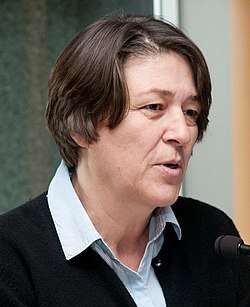
A candidate for the presidency of the European Commission Jean-Claude Juncker wished to have a name of the candidate for the new Slovenian commissioner until 1 August 2014.[5] A huge debate took place right after the election and was a played a part of the pre-election time. Bratušek, who was still a prime minister at the moment, wished to send a name of the candidate by herself, which was strongly opposed by the leader of SMC Miro Cerar. After his victory on the parliamentary elections, he proposed the current commissioner Janez Potočnik as a potential common candidate of the government and the potential new coalition parties.[6] The government placed his proposal on the list of candidates along with the Prime Minister Alenka Bratušek (ZaAB), Karl Erjavec (DeSUS-ALDE) and Tanja Fajon (SD-PES). The actual commissioner withdrew his candidature, as he did not agree with the multitude of the candidates.[7] The self nomination of Alenka Bratušek caused even bigger storm in Slovenian political atmosphere, as many saw her move as an act of private interest. Her action is now under investigation by Commission for the Prevention of Corruption of the Republic of Slovenia (KPK).[8] Driven by decisive victory on the election to European parliament, the Slovenian MEP's members of the EPP, Milan Zver (SDS), Alojz (Lojze) Peterle (NSi), Franc Bogovič (SLS), Romana Tomc (SDS) and Patricija Šulin (SDS) wrote a letter of complaint and concern to Jean-Claude Juncker expressing regret as none of the proposed potential commissioner is not a member of the triumphant EPP.[9] Miro Cerar was displeased with the expulsion of Janez Potočnik from the race for the European commissioner, and announced his reaction as soon as he will be named and confirmed as a Prime Minister-designate on 25 August 2014. Cerar, as the newly named Prime Minister-designate, declared his first action will be a letter to Juncker in which he shall consult the candidate for the new leader of European Commission. In the background a big lobbying battle took place, as Tanja Fajon, strongly supported by PES, has been invited to formal conversation with Juncker. Karl Erjavec also announced a meeting with potential leader of the Commission after the appointment of presidents of the European Council on 30 August.[10] Janez Potočnik returned to the race, after SMC refused co-operation with ZaAB in the new coalition, but was soon backed out by the original trio of candidates (Bratušek, Erjavec and Fajon).[11] Prime minister designate Cerar announced his support to Fajon and Erjavec, but ex prime minister Bratušek did not back down and continued lobbying in the European parliament, looking for support among the European parties.[12] Juncker soon named Bratušek a Vice-President of the European Commission designate and a European Commissioner for Energy designate, but she faced big opposition both in European parliament and in Slovenia, as the people did not support her candidature. She faced a hearing in front of the representatives of the European Parliament on 6. of October. European MP's were not impressed by her presentation and vision for the Energy Union so they refused her as a candidate for the named position and asked Juncker to replacer her or name her on a new position.[13] Under an investigation of Commission for the Prevention of Corruption of the Republic of Slovenia and huge pressure from Slovenia, Bratušek finally resigned as the candidate for Commissioner from Slovenia on 9. of October 2014.[14] New Cerar's government named ex Minister without Portfolio responsible for Development, Strategic Projects and Cohesion Violeta Bulc, who was confirmed as a candidate for European Commissioner for Transport and later also passed the hearing in front of the European MP's.[15] Bulc assumed her new position on 1 November 2014.
References
- http://www.europarl.europa.eu/elections2014-results/en/country-results-si-2014.html
- Saša Banjanac Lubej (23 January 2013). "DL zapušča koalicijo. Virant, Pličanič in Šušteršič odstopajo". MMC RTV Slovenija.
- "Slovenia government facing collapse as PM loses party leadership". The Guardian. Associated Press. 26 April 2013.
- State Election Commission (10 June 2014). "Poročilo o izidu volitev poslancev iz Republike Slovenije v Evropski parlament" (PDF).
- "Juncker slovenski predlog za evropskega komisarja pričakuje do konca tedna". MMC RTV Slovenija. 28 July 2014.
- "SMC za evropskega komisarja predlaga Janeza Potočnika". MMC RTV Slovenija. 29 July 2014.
- "Kandidati za komisarja: Bratuškova, Erjavec in Fajonova. Virant odšel s seje". MMC RTV Slovenija. 31 July 2014.
- "KPK preiskuje kandidaturo Alenke Bratušek. Kabinet: Ne gre za zasebni interes". MMC RTV Slovenija. 5 August 2014.
- "Boj za položaj komisarja: slovenski evroposlanci iz EPP-ja pisali Junckerju". MMC RTV Slovenija. 3 August 2014.
- "Cerar nezadovoljen z izborom EU-komisarja, vendar (še) ne bo ukrepal". MMC RTV Slovenija. 11 August 2014.
- "Potočnik pripravljen še tretjič postati slovenski komisar". MMC RTV Slovenija. 25 August 2014.
- "Cerar proti kandidaturi Bratuškove". MMC RTV Slovenija. 27 August 2014.
- "Odbora za energijo in okolje zavrnila Alenko Bratušek". MMC RTV Slovenija. 8 October 2014.
- "Bratuškova se je povsem umaknila iz komisarske tekme". MMC RTV Slovenija. 9 October 2014.
- "Violeta Bulc je ustrezna kandidatka za evropsko komisarko". MMC RTV Slovenija. 21 October 2014.
